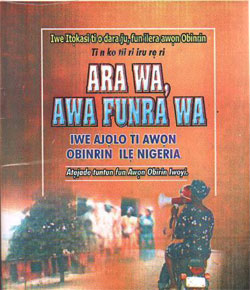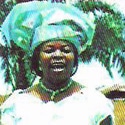Nigeria: Women for Empowerment, Development and Gender Reform
 Publication
Publication
Posters, Stickers and Other Print and Non-Print Materials
Language
Yoruba and Pidgin English
Our Bodies, Ourselves Project
Women for Empowerment, Development and Gender Reform (WEDGR) adapted sections of Our Bodies, Ourselves into two local dialects: Pidgin English and Yoruba.
The former is spoken across the country, while the latter is spoken in local communities served by the organization.
The focus is on safer sex, sexual health, sexuality, HIV and AIDS, birth control, pregnancy, infertility and assisted reproduction. The materials are distributed in formats such as posters and stickers, and used in grassroots trainings and creative campaigns designed to reach millions across Nigeria.
While working to raise awareness in communities with high numbers of HIV-positive women, WEDGR used the local canoe system, which ferries passengers from remote farms to marketplaces, and traveled via motorcycle, using megaphones to share health messages with neighboring villages.
One of its bold outreach projects engages men as allies and partners in change; it grew out of a home visit initiative to convince men to allow their wives to attend WEDGR’s workshops.
How to Obtain Copies
For more information and to obtain copies of materials, please contact Women for Empowerment, Development and Gender Reform: wedgr2000 [AT] yahoo.com
Community Action & Activism
WEDGR is a group of all-female volunteers, including trained health workers, paralegals, lawyers, gynecologists, midwives and teachers. Driven by a mission to increase access to evidence-based information in local communities, the organization’s outreach focuses on HIV/AIDS, domestic violence, and reproductive health.

In addition to the outreach described above, WEDGR holds peer educator trainings with village hair dressers, many of whom meet with clients on a weekly basis. It also organizes outreach walks to disseminate health information and recruit volunteers. These walks have drawn support from older women, many of whom help by providing meals and making t-shirts.
The organization has faced tremendous setbacks in recent years. One colleague was killed during an attack on outreach workers in 2009. A deliberately set fire destroyed WEDGR’s office soon after.
In 2010, seven team members were kidnapped and assaulted. They were released after a month in exchange for ransom paid by family, friends and community chiefs.
WEDGR has since re-grouped and re-located. One of its members, Our Bodies, Ourselves project coordinator Eyitemi Mogbeyiteren, wrote about the assault, including her subsequent diagnosis with HIV and the discrimination she experienced in her community, and her decision to “raise my voice and change the fear and shame into something positive.”
We are now expanding our HIV/AIDS outreach to include palliative care — care that relieves not only the physical but also the emotional, spiritual and socially generated suffering faced by a person infected with the virus. It is one of the most valuable services that can be offered to someone with terminal illness and their family. Unfortunately, it’s availability in my community is zero.
Using Our Bodies, Ourselves as our tool yet again, our plan is to train ourselves on this holistic and critical model of care, and bring our services to our women via support groups and home visits. We will also develop a training manual for other caregivers, including family and community health workers, so they can comfort their loved ones and clients.
Soon after, WEDGR planned an “itinerant exposition” — a dozen activists traveled the country on an “Anti-Rape, Anti-Kidnap and HIV/AIDS Bus,” to increase awareness of violence and HIV, and empower women and girls with information and self-defense skills.
Contact
Email: wedgr2000 [AT] yahoo.com
Address: PO Box 1235, Benin City, Edo State, Nigeria
